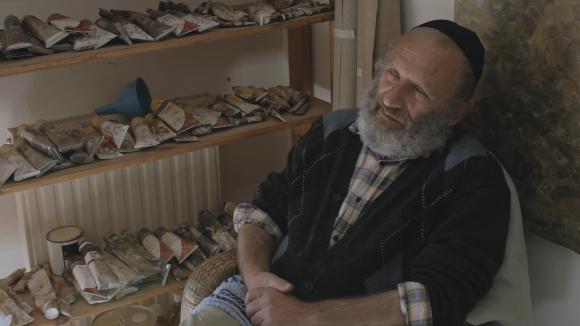After the premiere. The secret with Josef

But this is a film-deception. They are promising a dialogue – but the conversation is not developing, questions do not get answers. They are promising communication with Josef – but we get to interact with images, and they are not so much Josef's, but more of what he sees from his balcony. They are promising documentary – just images we get. Seen by Josef, and painted by Josef. Daughter makes a trip to visit her father, who is living in Israel for over a dozen years, because there he has found "his faith and his land", – he paints, she films, and "Dialogue With Joseph" becomes the debut film by director Elžbieta Josadė, produced by film studio "Just a Moment", and accepted into the program of the Scanorama festival.
The dialogue here is maybe just such, as in the scene where Josef shows Elžbieta photos of the Israeli land, and she asks to comment, because he had said her something previously over Skype about the unity of the land and the sky he is painting, or something. "I don't know," he answers with a laugh, and continues to speak in photographs. And he paints, and he looks at his painting and the view through the window, and it's beautiful to him, and he's also frightened of his work, whereas she films and keeps filming until the time of the film is occupied for long by deserts and mountains, and you understand that the painter and the film director (who had previously studied painting and sculpture) are talking in pieces of art. Without worrying at all, whether anybody else will understand them, or will receive any information, or will tune in into their conversation. Watch and just be, like father and daughter, drinking tea.
Documentarians don't behave like this. Opinion journalism makers cling to a person and make him/her the hero of their film to reveal his/her personality, and through it – a problem or an era, well, at least the present time. Poets choose a theme, direction, they are avoiding concreteness, yet they leave room for interpretation. Elžbieta Josadė is leaning towards poetry, but while filming she remains the visual artist, to whom important is the composition, colouring, mood, but there's no need for a theme and its examining (the visit to her father is not a theme, but a circumstance), the more so she does not need information, at least in this film. Do you want to know who is Josef and what is he like? Is he an artist, or a person who likes to dip the brush into the dye and wipe over the canvas? Does he participate in exhibitions, is he appreciated? Or is he just feeling the pleasure of living while painting and painting while living? Does he have a family, or did he get separated and liberated? Is he destitute? The images of the land he is painting, will not answer that. But it's good for him there, it seems.
Talk to artists who were students in the late seventies, and now they are about over 60, mention Josifas (yes, Josifas!) Josadė – how many stories will come up at once, how many memorable adventures, jokes, incredible situations will be remembered, how many creative games, joy, being together, because he was friends with all the coolest people and everyone was with him. There are slight hints of Josifas' laughter, playfulness and spree in the Elžbieta's film, which is actually more of a painting – that shot, for example, where the vast landscape is entered by its tiny painter wearing his kippah which he never takes off now. Or at the edge of the painting-frame, they both – the father and the daughter – get into the landscape; and then after a while, given to the grayish brown images of land, they get out of the frame through the same corner.
Maybe it is not only a painting, but also domestication – of father and daughter, two artists, people who see each other rarely, but they are close and they do not need to express themselves in words, especially if next to them is the video camera and the microphone is sticking between the brushes. There are documentary films where the director – the offspring – wants to find out something substantial with their parent. To heal some wound of the past and even to wise up the society. Not Elžbieta Josadė, she stepped into her father's landscape. The landscape did not resist, the young director even played maybe too long with it, made it the main character. Father remained a mystery and, sort of, some supporting character. Maybe not for the daughter, maybe just for the audience, if it is needed here at all. And so much was left behind the scenes, that you could stretch it into not just a short film, but a full documentary series – about individuals and eras, about feelings and play. Don't you think, Josifas?